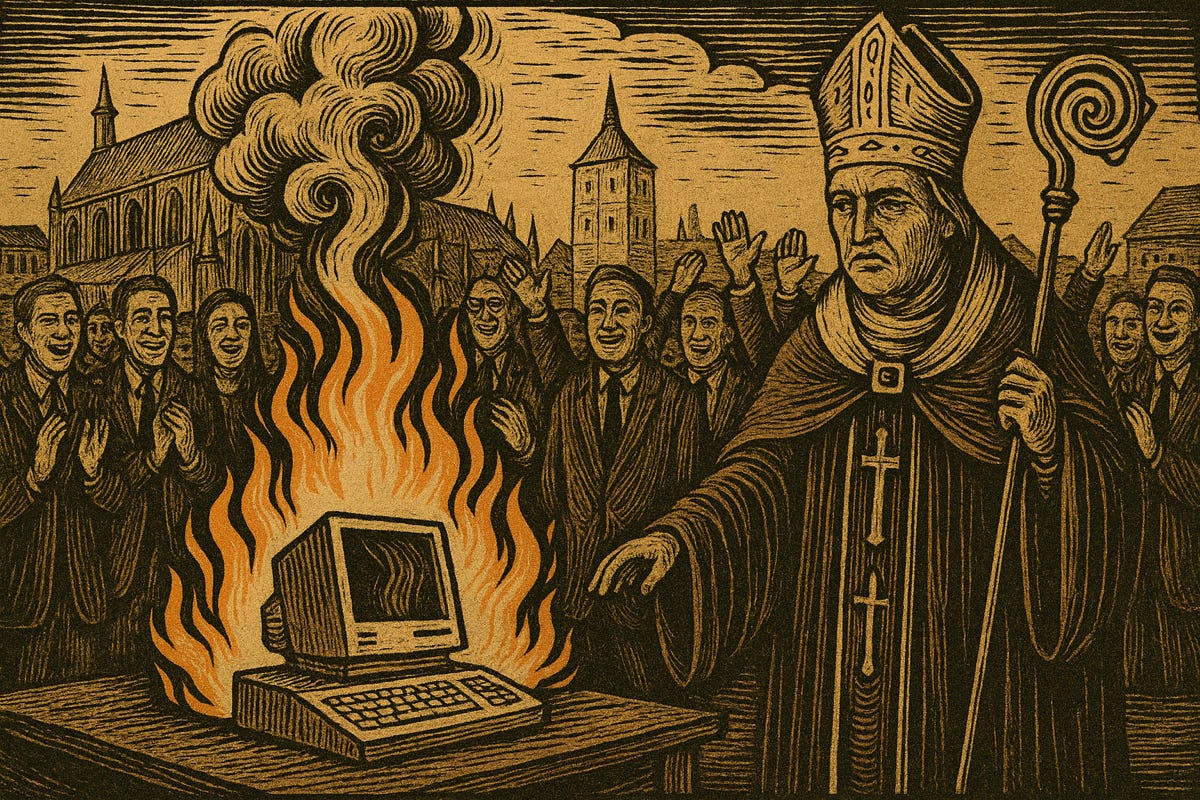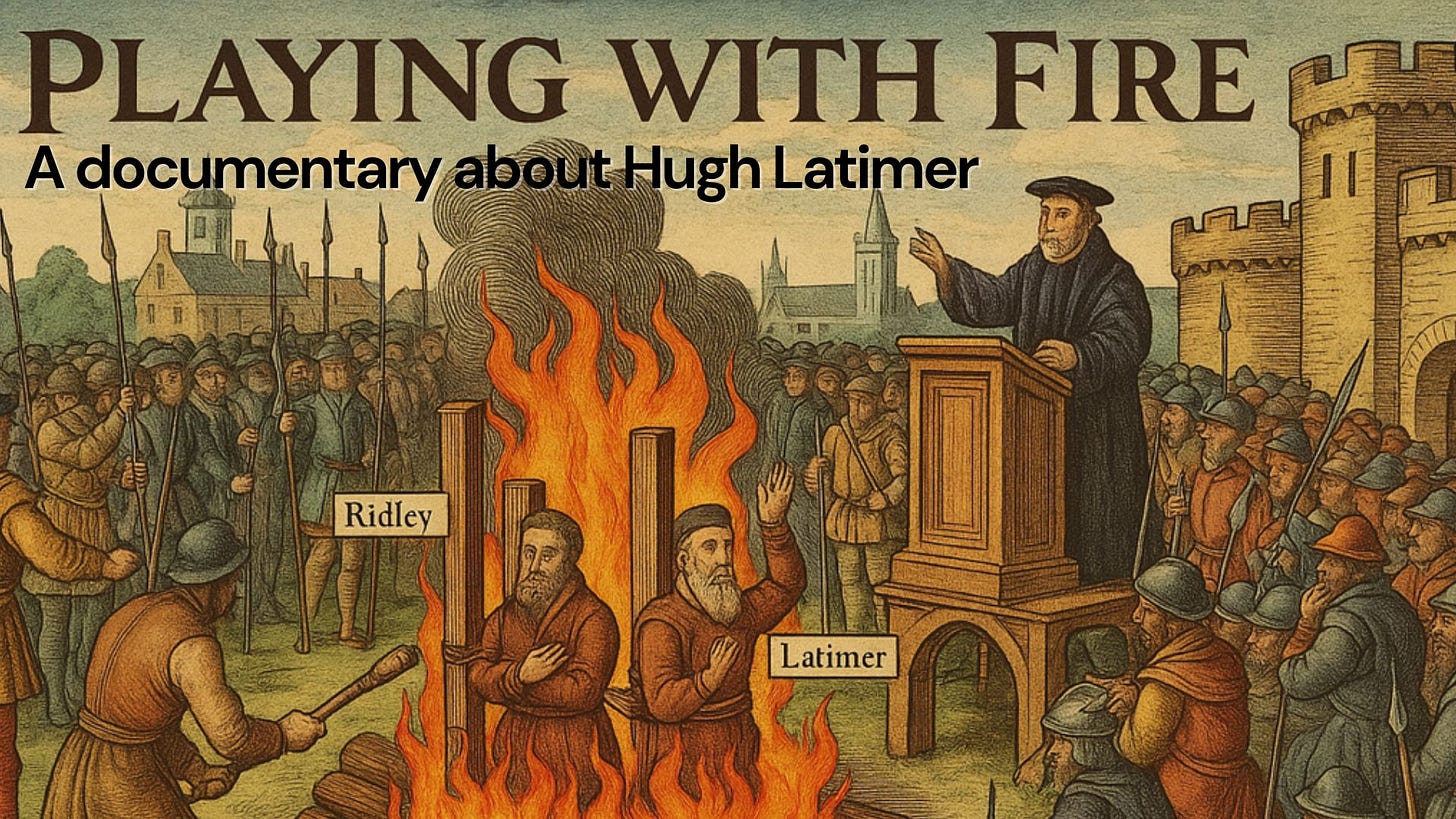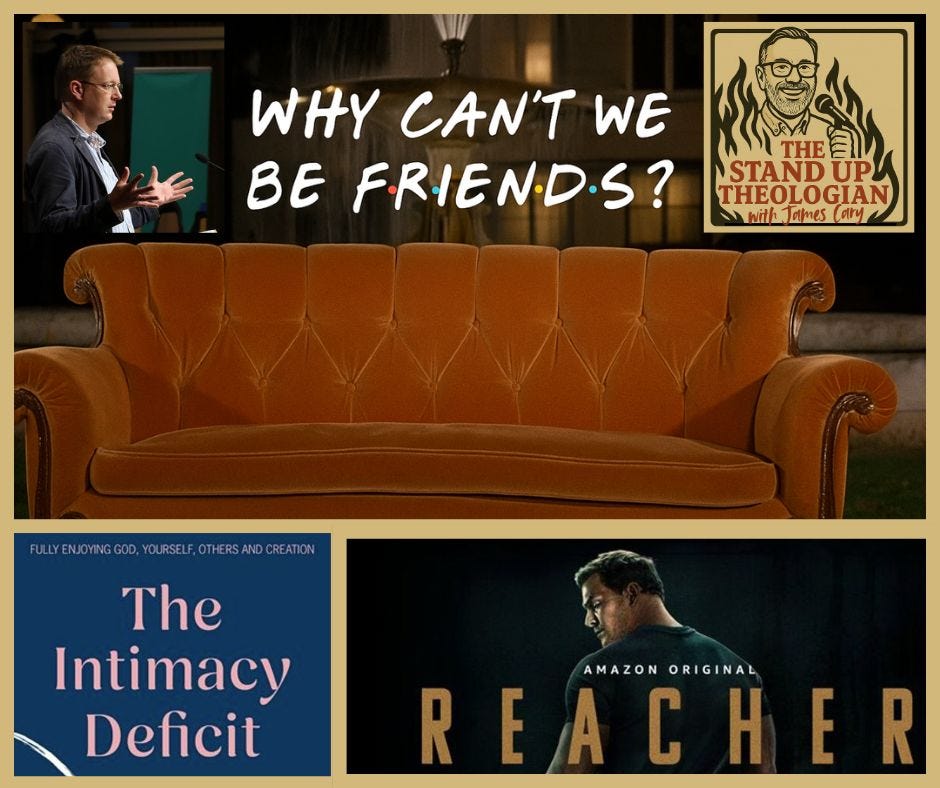The First To Be Burned
And the pain of switching IT Systems
Last time, we wondered why an educated, decent man like Cuthbert Tunstall, Bishop of London, should gather together every copy of Tyndale’s New Testament he could find and publicly burn them outside St Paul’s Cathedral on 27th October 1526.
But in those days, the English did not just burn books. We burned people. We would do well to remember that and learn from it.
That is why the Church of England commemorates Hugh Latimer and Nicholas Ridley on 16th October, the day they were burned in 1555, just outside Balliol College in Oxford. They had been bishops in the Church of England: Hugh Latimer, the Bishop of Worcester; Ridley, the Bishop of Rochester, then London. What had happened that brought about such a horrifying spectacle of violence in a civilised place like Oxford? We will get to that shortly.
First, allow me to leap to an illustration. The last time I hired a car was only a couple of years ago. The staff member’s computer screen was essentially black with blue-green text. It looked a lot like a very basic MS-DOS style operating system. Why was Europcar still operating a system that looked like it was developed in around 1987?
Because the transition to a new system had not, so far, been worth the agony. Anyone who has been involved in the transitioning of an old computer systems to new ones can relate to the maddening frustration of the painful process.
That is what happens in England, starting in 1401 and ending in 1559. That’s 158 years of transitioning from Roman Catholicism to Protestantism. Despite outward appearances, these are two completely different operating systems. Microsoft Windows and Mac OS look superficially similar but are fundamentally different underneath.
The Firestarter
1401 is as good a year as any to mark the beginning of the transition of England. It is point at which an alternative system called Lollard, became available. And there was a rapid attempt to violently stamp it out. 1401 is the year when a new law – De Heretico Comburendo – was passed making heresy a capital crime. This would particularly apply to expressing belief in Lollardy, the teachings of John Wycliffe, or attempting to translate the Bible into English.
Latimer and Ridley were burned for almost exactly the same reason as the very first man to fall foul of this new law. He was burned the same year as the law was passed. That’s the problem with a new law. It’s like a new pair of scissors or a stapler. The moment you have it, you immediately want to use it. The law was used on William Sawtry.
The Fate of the First
A priest from King’s Lynn in Norfolk, Sawtry was brought before Henry Despenser, Bishop of Norwich in 1399, accused of denying free will, image worship, pilgrimages and the doctrine of transubstantiation. After a two-day examination he was found guilty of these charges. Under pressure, he recanted. But it didn’t last.
Soon afterwards, Sawtry was appointed parish priest of St Osyths, Walbrook in London. (You won’t find it today, having been destroyed by the Great Fire of London and not rebuilt.) Back in 1401, you would have heard Sawtry preaching the doctrines of Wycliffe again. At once, he was hauled up before a meeting of the Convocation in the chapter house of St Paul’s Cathedral. Arundel, the Archbishop of Canterbury, deemed this so serious, he took charge of his trial.
Sawtry “will not worship the cross on which Christ suffered, but only the Christ who suffered on the cross”. By 1401, the very cross itself was an object worthy of veneration. But worse, Sawtrey said “that after the pronouncing of the sacramental words of the body of Christ, the bread remains … as it was before, neither does it cease to be bread”. He was denying the doctrine of transubstantiation.
For Sawtry, any defence was futile. For Arundel, the Mass saw the bread and wine become the body and blood of Christ. Literally. Mass was a re-sacrifice of Christ. Sawtry however, agreed with the words of Wycliffe from 1380:
“The consecrated host is not the actual body of Christ, but a sacramental sign of it. … The bread remains bread, and the wine remains wine, after consecration, as before.” De Eucharistia
Arundel would presumably reply, “But the Church teaches the bread is the very body of Christ, and the wine his blood.” That is true. That is what the Church taught. And, as a priest, that is what Sawtry should teach – and what the laity should believe.
Sawtry, preaching something different from the accepted teachings of the Church, was saying the Church was in error. But in 15th Century England, the Church could not be in error, since it represented the sole means of salvation for all people. A Papal Bull issued by Eugene IV in 1442 confirmed the view of the Council of Florence:
“The Holy Roman Church firmly believes, professes and preaches that none of those existing outside the Catholic Church, not only pagans, but also Jews, heretics and schismatics, can have a share in eternal life; but that they will go into the eternal fire which was prepared for the devil and his angels, unless before the end of life they shall have entered into that Church;… no one… can be saved, unless he has remained in the bosom and unity of the Catholic Church.”
In short, it’s our way to heaven. Or the highway to hell.
The Impossible Case for the Defence
How could Sawtry prove the church was in error? With the Bible? This is why Wycliffe taught that the Bible should be translated into English: so that all could read the scriptures for themselves see what it actually said on this subject – and indeed on every subject.
But the Bible was merely one source for the Church which had become the supreme authority over all things spiritual. Other sources were the traditions, the teaching of the fathers – and Aristotle, for some reason – and saints whose teachings had been authenticated by miracles. The idea that the Bible was sole arbiter of doctrine was a non-starter. And the notion that it should be translated into the language of the people and passed around was deemed highly irresponsible.
An appeal to scripture, then, for Sawtry was inadmissible. And so he was doomed from the start. He was stripped of his priesthood in order to be turned back into a layman. Six bishops gathered to strip Sawtry of his priestly vestments and cut his hair to remove any sign of the tonsure before he was burned.
And so to Oxford in 1555…
In 1555, the same arguments were played out at St Mary’s University Church in Oxford. During weeks of questioning, Latimer said that he read through the Scriptures seven times in prison and could not find “the marrow bones and sinews” of the mass saying, “You shall have no hope in me to turn.”
Latimer went to the flames. But just as Sawtry’s death was the beginning, Latimer’s death was the beginning of the end of Catholic England. Protestantism was finally coming. Only in that context does the rest of English history – and even our society today – make any sense at all.
Next week, Cary’s Almanac will drop on Thursday, since that is 16th October, the day on which we remember Latimer and Ridley. My Latimer documentary, Playing with Fire, will be available from that day.
Don’t miss that instalment, so make sure you are subscribed:
For now, why not go and watch my shorter video about the botched burning of fellow Marian Martyr and bishop, John Hooper?
On the latest Stand-Up Theologian podcast, I had a lovely conversation with Ed Shaw, an author and pastor, who has written a new book, The Intimacy Deficit – which is about friendship. Ed wants to reclaim intimacy as something broader than sex: a deep human need that includes friendship with others, with God, with ourselves, and even with creation. This is vital in a culture that has lost confidence in intimacy and friendship.
We talked about how sitcoms like Friends and Frasier reflect that longing. Yet the shows of today give us lone heroes like Reacher or Jackson Lamb from Slow Horses. Nobody’s perfect. We are “glorious ruins,” loved by God despite our quirks. Perhaps even because of them. And let’s be honest: we don’t really change as Ed demonstrates by reading a school report that could have been written about him yesterday. What’s the solution? Not just friendship and self-knowledge, but nature and the Psalms. Why not find out more by having a listen?
Thanks for reading all the way to end. You’ll be hearing from me again on Thursday 16th October!





